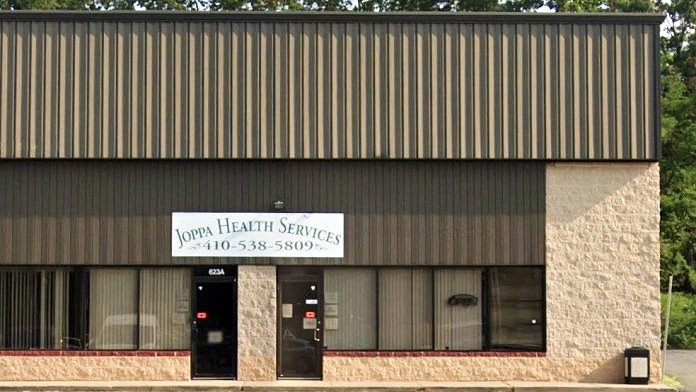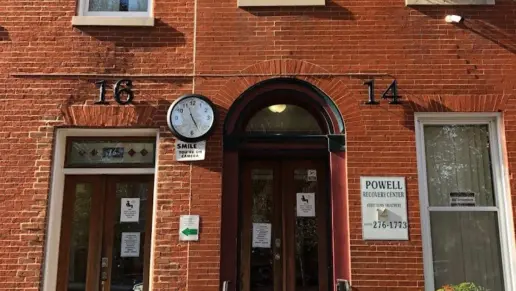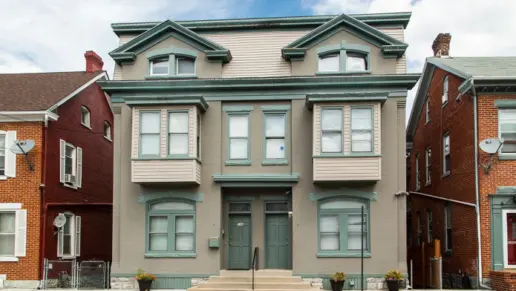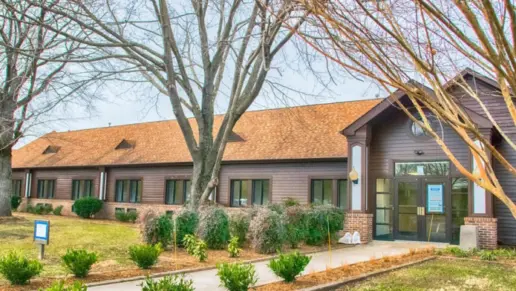All about the money and not helping people at all. If I am late by a few minutes, they refuse to let me talk to my counselor. However, if they are the ones late, I should wait for them? SO unfair! They are not willing to help you, literally the worst clinic around
About Joppa Health Services
Joppa Health Services is a methadone clinic located in Joppa, Maryland. Joppa Health Services focuses on helping those who are fighting to overcome opioid addiction by providing medication to help encourage recovery efforts and relieve the symptoms of withdrawal. Joppa Health Services also works to provide their residents with additional resources, including emergency counseling, for those who may be in a crisis situation. This facility focuses on outpatient treatment with opioid maintenance therapy with the help of Suboxone. Currently, Joppa Health Services accepts money orders, credit cards, cash and Medicaid to cover the costs associated with receiving treatment.
It’s important to note that Joppa Health Services isn’t just focused on helping clients overcome their opioid addiction. If a resident is also seeking help to stop tobacco usage, Joppa Health Services gives their residents a phone number to connect with trained coaches who will help residents stop using tobacco.
Joppa Health Services primarily works with those who are looking for co-occurring treatment options, but they also work with pregnant women, and they have both a male-specific and a female-specific program. A lot of people also love how Joppa Health Services encourages those seeking help for their addiction to find mental health support and do so by providing referrals to MOSAIC.
The biggest way that Joppa Health Services works to support those fighting against opioid addiction is through patient education and safety. There are a ton of materials they offer to anyone walking in their doors, such as a patient handbook and videos, to make sure that everyone starting their journey to recovery is well informed with accurate and medically-backed information.
Latest Reviews
Rehab Score
Gallery

Location
Other Forms of Payment
Medicaid is a state based program that helps lower-income individuals and families pay for healthcare. Medicaid covers addiction treatment so those enrolled can use their coverage to pay for rehab. When a program accepts Medicaid the client often pays very little or nothing out of their own pocket.
Self-pay involves paying for treatment out of your own pocket. You can use savings or credit, get a personal loan, or receive help from family and friends to fund your treatment. If you don't have insurance or your insurance plan doesn't cover a specific program, self-pay can help ensure you still get the care you need.
Addiction Treatments
Levels of Care
Treatments
The goal of treatment for alcoholism is abstinence. Those with poor social support, poor motivation, or psychiatric disorders tend to relapse within a few years of treatment. For these people, success is measured by longer periods of abstinence, reduced use of alcohol, better health, and improved social functioning. Recovery and Maintenance are usually based on 12 step programs and AA meetings.
Once a person has become addicted to a substance, drug rehab in Maryland is often necessary to overcome that addiction. These programs provide the tools individuals need to manage the physical, mental, and emotional issues involved and begin a successful recovery journey.
Opioid rehabs specialize in supporting those recovering from opioid addiction. They treat those suffering from addiction to illegal opioids like heroin, as well as prescription drugs like oxycodone. These centers typically combine both physical as well as mental and emotional support to help stop addiction. Physical support often includes medical detox and subsequent medical support (including medication), and mental support includes in-depth therapy to address the underlying causes of addiction.
Substance rehabs focus on helping individuals recover from substance abuse, including alcohol and drug addiction (both illegal and prescription drugs). They often include the opportunity to engage in both individual as well as group therapy.
Programs


Clinical Services
Cognitive Behavioral Therapy (CBT) is a therapy modality that focuses on the relationship between one's thoughts, feelings, and behaviors. It is used to establish and allow for healthy responses to thoughts and feelings (instead of unhealthy responses, like using drugs or alcohol). CBT has been proven effective for recovering addicts of all kinds, and is used to strengthen a patient's own self-awareness and ability to self-regulate. CBT allows individuals to monitor their own emotional state, become more adept at communicating with others, and manage stress without needing to engage in substance abuse.
In individual therapy, a patient meets one-on-one with a trained psychologist or counselor. Therapy is a pivotal part of effective substance abuse treatment, as it often covers root causes of addiction, including challenges faced by the patient in their social, family, and work/school life.
Motivational Interviewing (MI) is a clinical approach to helping people with substance abuse issues and other conditions shift behavior in positive ways. It is more goal-oriented than traditional psychotherapy, as MI counselors directly attempt to get clients to consider making behavioral change (rather than wait for them to come to conclusions themselves). Its primary purpose is to resolve ambivalence and help clients become able to make healthy choices freely.
Accreditations

The Commission on Accreditation of Rehabilitation Facilities (CARF) is a non-profit organization that specifically accredits rehab organizations. Founded in 1966, CARF's, mission is to help service providers like rehab facilities maintain high standards of care.
CARF Accreditation: Yes
Accreditation Number: 38722

The Substance Abuse and Mental Health Services Administration (SAMHSA) is a branch of the U.S. Department of Health and Human Services. Established in 1992 by congress, SAMHSA's mission is to reduce the impact of substance abuse and mental illness on American's communities.
SAMHSA Listed: Yes
Contact Information
623-A Pulaski Highway
Suite A
Joppa, MD 21085


